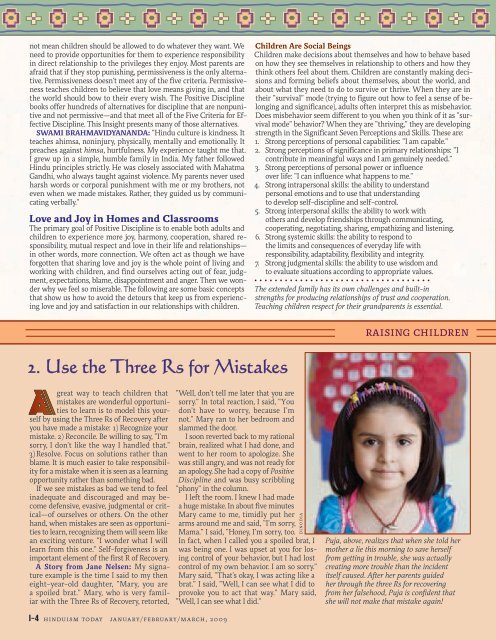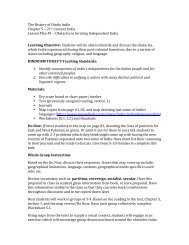Hinduism Today January 2009 - Cover, Index, Front Articles
Hinduism Today January 2009 - Cover, Index, Front Articles
Hinduism Today January 2009 - Cover, Index, Front Articles
Create successful ePaper yourself
Turn your PDF publications into a flip-book with our unique Google optimized e-Paper software.
not mean children should be allowed to do whatever they want. Weneed to provide opportunities for them to experience responsibilityin direct relationship to the privileges they enjoy. Most parents areafraid that if they stop punishing, permissiveness is the only alternative.Permissiveness doesn’t meet any of the five criteria. Permissivenessteaches children to believe that love means giving in, and thatthe world should bow to their every wish. The Positive Disciplinebooks offer hundreds of alternatives for discipline that are nonpunitiveand not permissive—and that meet all of the Five Criteria for EffectiveDiscipline. This Insight presents many of those alternatives.Swami Brahmavidyananda: “Hindu culture is kindness. Itteaches ahimsa, noninjury, physically, mentally and emotionally. Itpreaches against himsa, hurtfulness. My experience taught me that.I grew up in a simple, humble family in India. My father followedHindu principles strictly. He was closely associated with MahatmaGandhi, who always taught against violence. My parents never usedharsh words or corporal punishment with me or my brothers, noteven when we made mistakes. Rather, they guided us by communicatingverbally.”Love and Joy in Homes and ClassroomsThe primary goal of Positive Discipline is to enable both adults andchildren to experience more joy, harmony, cooperation, shared responsibility,mutual respect and love in their life and relationships—in other words, more connection. We often act as though we haveforgotten that sharing love and joy is the whole point of living andworking with children, and find ourselves acting out of fear, judgment,expectations, blame, disappointment and anger. Then we wonderwhy we feel so miserable. The following are some basic conceptsthat show us how to avoid the detours that keep us from experiencinglove and joy and satisfaction in our relationships with children.Children Are Social BeingsChildren make decisions about themselves and how to behave basedon how they see themselves in relationship to others and how theythink others feel about them. Children are constantly making decisionsand forming beliefs about themselves, about the world, andabout what they need to do to survive or thrive. When they are intheir “survival” mode (trying to figure out how to feel a sense of belongingand significance), adults often interpret this as misbehavior.Does misbehavior seem different to you when you think of it as “survivalmode” behavior? When they are “thriving,” they are developingstrength in the Significant Seven Perceptions and Skills. These are:1. Strong perceptions of personal capabilities: “I am capable.”2. Strong perceptions of significance in primary relationships: “Icontribute in meaningful ways and I am genuinely needed.”3. Strong perceptions of personal power or influenceover life: “I can influence what happens to me.”4. Strong intrapersonal skills: the ability to understandpersonal emotions and to use that understandingto develop self‐discipline and self‐control.5. Strong interpersonal skills: the ability to work withothers and develop friendships through communicating,cooperating, negotiating, sharing, empathizing and listening.6. Strong systemic skills: the ability to respond tothe limits and consequences of everyday life withresponsibility, adaptability, flexibility and integrity.7. Strong judgmental skills: the ability to use wisdom andto evaluate situations according to appropriate values.The extended family has its own challenges and built-instrengths for producing relationships of trust and cooperation.Teaching children respect for their grandparents is essential.dinodiaFour Steps for Winning CooperationChildren feel encouraged when they thinkyou understand their point of view. Oncethey feel understood, they are more willingto listen and to work on a solution tothe problem. Using the following Four Stepsfor Winning Cooperation is a great way tocreate a connection before seeking to solve abehavioral problem.1. Express understanding for thechild’s feelings. Be sure to checkwith him to see if you are right.2. Show empathy without condoninghis behavior. A nice touch hereis to share times when youhave felt or acted similarly.3. Share your feelings and perceptions.4. Invite the child to focus on a solution.Ask if he has any ideas on whatto do in the future to avoid theproblem. If he doesn’t, offer somesuggestions and seek his agreement.An attitude of friendliness, caring and respectis essential to these steps. Your decisionto create a connection will be enoughto create positive feelings in you. After thefirst two steps, the child will be won over.He will now be ready to hear you when youuse the third step (even if you may haveexpressed your feelings many times beforewithout being heard). The fourth step is2. Use the Three Rs for MistakesAgreat way to teach children thatmistakes are wonderful opportunitiesto learn is to model this yourselfby using the Three Rs of Recovery afteryou have made a mistake: 1) Recognize yourmistake. 2) Reconcile. Be willing to say, “I’msorry, I don’t like the way I handled that.”3) Resolve. Focus on solutions rather thanblame. It is much easier to take responsibilityfor a mistake when it is seen as a learningopportunity rather than something bad.If we see mistakes as bad we tend to feelinadequate and discouraged and may becomedefensive, evasive, judgmental or critical—ofourselves or others. On the otherhand, when mistakes are seen as opportunitiesto learn, recognizing them will seem likean exciting venture. “I wonder what I willlearn from this one.” Self‐forgiveness is animportant element of the first R of Recovery.A Story from Jane Nelsen: My signatureexample is the time I said to my theneight‐year‐old daughter, “Mary, you area spoiled brat.” Mary, who is very familiarwith the Three Rs of Recovery, retorted,“Well, don’t tell me later that you aresorry.” In total reaction, I said, “Youdon’t have to worry, because I’mnot.” Mary ran to her bedroom andslammed the door.I soon reverted back to my rationalbrain, realized what I had done, andwent to her room to apologize. Shewas still angry, and was not ready foran apology. She had a copy of PositiveDiscipline and was busy scribbling“phony” in the column.I left the room. I knew I had madea huge mistake. In about five minutesMary came to me, timidly put herarms around me and said, “I’m sorry,Mama.” I said, “Honey, I’m sorry, too.In fact, when I called you a spoiled brat, Iwas being one. I was upset at you for losingcontrol of your behavior, but I had lostcontrol of my own behavior. I am so sorry.”Mary said, “That’s okay, I was acting like abrat.” I said, “Well, I can see what I did toprovoke you to act that way.” Mary said,“Well, I can see what I did.”dinodiaraising childrenPuja, above, realizes that when she told hermother a lie this morning to save herselffrom getting in trouble, she was actuallycreating more trouble than the incidentitself caused. After her parents guidedher through the three Rs for recoveringfrom her falsehood, Puja is confident thatshe will not make that mistake again!14 strategies parents need to know3. Spend Time with Your ChildrenOne important way to help childrenfeel encouraged is to spend specialtime being with them. Have fun!One primary opportunity for cultivatingcloseness: when tucking children into bed,ask them to share with you their saddesttime during the day and their happiest timeduring the day. Then you share with them.You will be surprised what you learn.A Story from Amala Katir: Sita didn’t realizehow important one positive disciplinetool had become until one night when shetucked her two girls into bed and walkedout. One daughter, Ravindra, shouted,“Mom! You forgot to ask what was the saddestthing that happened today and whatwas the happiest thing.” Not only had theirprevious endless crying and getting out ofbed repeatedly stopped, but these questionsasked every night as a remedy had openeda wonderful new world of communicationand bonding.Scheduled Time: One of the most encouragingthings parents can do for their childrenis to spend regular, scheduled specialtime with them. You may already spendlots of time with your children. Howeverthere is a difference between “have to” time,“casual time,” and “scheduled special time.”There are several reasons why specialtime is so encouraging:1) Children feel a sense of connectionwhen they can count on special time withyou. They feel that they are important toyou. This decreases their need to misbehaveas a mistaken way to find belonging andsignificance.2) Scheduled special sharing is a reminderto you about why you had children in thefirst place—to enjoy them.3) When you are busy and your childrenwant your attention, it is easier for them toaccept that you don’t have time when yousay, “Honey, I can’t right now, but I sure amlooking forward to our special time at 4:30.”Plan the special time with your children.Up to age 6, it can be daily. From 6 to 12 itcan be more occasional, even weekly. Brainstormahead of time a list of things youwould like to do together then.dinodiaA father in Mumbai creates a rangolidesign with his daughter on Dipavali. Byhaving fun with her, he builds a relationshipof trust, affection and cooperation.I-4 hinduism today january/february/march, <strong>2009</strong> january/february/march, <strong>2009</strong> hinduism today I-5
















